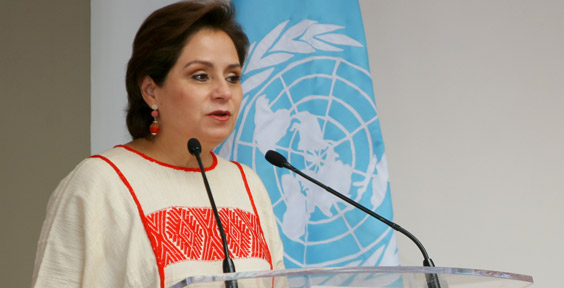The G20 group of nations, cooperating together and supporting vulnerable countries, has the power to propel the global economy towards the low-carbon, resilient and prosperous future defined by the Paris Climate Change Agreement, writes the Executive Secretary of the UN Framework Convention on Climate Change (UNFCCC), Patricia Espinosa, in a recent edition of G7G20. She adds that the Paris Agreement is not like a chain that can be broken by one link, but an ever deeper and widening web of internationally aligned self-interest that bodes well now and over the years and decades to come.

It is a busy year for the government and people of Germany: five months after the country hosts the G20 summit in Hamburg, the eyes of the world will be on the former capital city of Bonn for the 2017 United Nations climate conference.
The links are not merely geographical
The G20 members, acting nationally, cooperating together and supporting vulnerable countries beyond their group, have the power to propel the global economy towards the low-carbon, resilient and prosperous future envisioned in the Paris Climate Change Agreement as part of the wide-ranging Sustainable Development Goals.
This was underlined in a recent report by the Organisation for Economic Co-operation and Development (OECD) called Investing in Climate, Investing in Growth.
It argues that “bringing together the growth and climate agendas” could add one per cent to average economic output in the G20 by 2021 and lift 2050 output by up to 2.8 per cent.
If the economic benefits of avoiding climate change impacts such as coastal flooding or storm damage are factored in, the net increase to gross domestic product in 2050 would be nearly five per cent.
A just transition
The report singles out infrastructure investment as crucial. Limiting the global temperature rise to well below 2°C, in line with one of the Paris Agreement’s temperature goals, will require close to $7 trillion a year between now and 2030.
But the study points out that this is only around 10 per cent more than investing in carbon-intensive infrastructure and indeed would help save money – as well as help save the planet – because of increases in energy efficiency leading to annual fuel savings globally of around $1.7 trillion.
The report makes recommendations that underline the importance of integrating the aims and ambitions of the Paris Agreement in national economic policies – for example, the strengthening of climate mitigation policies including carbon pricing, fossil-fuel subsidy reform, smart regulations and the use of public procurement to help drive low-carbon growth.
The report also underlines the importance of private sector investments and support from local government, companies and workers is not just a transition, but a just transition.
Continuing Paris in Bonn
The OECD report is timely – in November more than 190 countries, presided over by the island state of Fiji, will be hosted by the UN Framework Convention on Climate Change in Bonn on the banks of the Rhine.
The 2017 UN climate conference needs to make important strides towards finishing the guidelines needed to fully implement the Paris Agreement while also setting the stage for a dialogue in the following year on achieving the agreement’s even lower goal of 1.5°C.
The Bonn conference will also prepare for an assessment or stocktake, planned for 2018, that will seek to evaluate how all the countries’ efforts are collectively getting the world on track to achieve the Paris Agreement.
Higher ambition is needed, and needed quickly, as the OECD and other reports say. The current set of national climate action plans are a marked improvement over what was on the table pre-Paris 2015, but they are still behind the curve.
Preserving forests
It is not just hard infrastructure such as the power, buildings and transportation sectors where climate-friendly investment is needed – there also needs to be smarter management of the world’s soft infrastructure, including forests and agricultural systems.
There is positive news here too. CDP, the former Carbon Disclosure Project, is reporting that ever more companies are joining an international initiative under the post-Paris global climate action agenda aimed at deforestation-free commodity supply chains.
New ones include McDonald’s Latin American franchise Arcos Dorados, Swiss fragrance and flavour company Firmenich, Brazilian meatpacker JBS, American healthcare company Johnson & Johnson, Brazilian paper producer Klabin and Canadian restaurant group Restaurant Brands International.
Forests play a critical role in reducing global warming, and deforestation itself is responsible for as much as 15 per cent of global greenhouse gas emissions, as well as habitat loss and social conflict.
Momentum since Paris has been nothing short of breathtaking – the agreement came into force less than 12 months after being adopted and to date over 150 Parties to the Agreement have ratified it.
The announcement by the United States in June that it would withdraw from the Paris Agreement has triggered widespread disappointment but also unprecedented solidarity among all other nations and cities, states and the private sector in the US and beyond.
There’s a new reality in global climate action
That reality is that this is not like a chain, broken by one link, but an ever deeper and widening web of internationally aligned self-interest that bodes well now and over the years and decades to come.
With the Prime Minister of Fiji, Frank Bainimarama, the Government of Germany and the City of Bonn, I look forward to welcoming all the parties to the Paris Agreement in November so we together can accelerate implementation further and faster everywhere and write the next historic chapters of our shared future.
